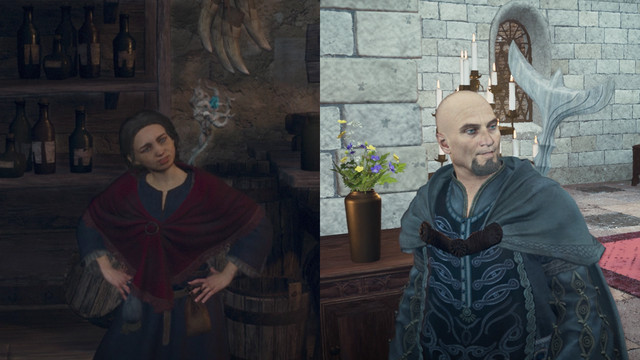A lot of movie follow-ups to anime series have lately come with an expectation of the audience having done their homework – for example, the My Hero Academia or Demon Slayer films (though in the latter’s case, those movies are episode compilations in disguise). For anyone hoping to use these events as a way into a long-running story, that’s still a high barrier of entry to vault over. There’s blessedly no such expectation with Spy X Family: CODE White, a breezy adventure designed to capture the appeal of a typical episode for a new audience while also doubling down on the elements that won the show so many fans in the first place.
It begins in a masquerade ball, the camera elegantly swooping across the hall while observing little pieces of gossip amidst its wealthy attendees. A man and his date separate from the rest, she propositions him in an office, he politely declines as she passes out, he then proceeds to steal some documents. The ludicrous, Mission Impossible-style escape is the cherry on top, and for all that theatricality, it’s just another day at the office for the secret agent Twilight. This scene at the top of CODE White is followed by a couple of others, making sure to introduce its principle cast and the almost sitcom-like hook of Spy X Family to unfamiliar viewers, and does so with both efficiency and, more importantly, a sense of fun.
Spy X Family takes place in a setting where two nations called Ostania and Westalis, modelled after divided post-war Germany, the peace between the two remains on a knife’s edge. It follows fake nuclear family constructed by Twilight, a spy from Westalis who has adopted the name “Loid Forger.”
Unbeknownst to Loid, his mild-mannered fake wife, Yor, is actually the country’s most notorious assassin, and she serves as a fun balancing act to Loid’s hypercompetence – Yor is mostly good at hitting stuff. The only person who knows the full truth of the matter is their adopted daughter Anya: a precocious, telepathic five-year-old and fan-favourite who delights in the fact that her parents have such cool jobs.
The family is representative of the tonal line that Spy X Family frequently dances on: couched in a realistic sense of peril thanks to its loving evocation of the cliches of the espionage genre, which it then gives a ludicrous twist. That begins with its The Americans-adjacent premise, where the emotional wellbeing of his family is closely tied to the fate of the country. CODE White is a demonstration of why the premise feels so ironclad: any everyday occurrence could turn into something equal parts disastrous and hilarious, so a weekend misadventure in another country fits right in.
This vaguely Christmassy side trip takes the Forgers out of the Cold War Berlin-esque city and into a more rustic, faux-Switzerland location. The setup for this, again, feels like a way to introduce familiar threads of the series to those who haven’t watched it yet, but Ichiro Okouchi’s efficient and colourful writing makes the reintroductions enjoyable enough even for existing fans. These scenes showcase Loid’s suaveness and absurd overpreparedness as well as his background showing during the masquerade, and Yor committing a grisly assassination with chilling politeness. The dominos of the plot start falling quickly thanks to those recurring, charming character quirks.
In maybe the most outsized example of the delight Spy X Family takes in making what should be a normal family activity into an immense drain on government resources, preparation for a school cooking competition somehow turns into a confrontation with the military. The chaos that stems from this conflict is maybe CODE White’s strongest suit: there’s not much here that expands the characters beyond what’s there in the show, but there’s some satisfaction in seeing the artists capture a little more of Loid, Anya, and Yor simply enjoying each other’s company. The continuing arc of Yor’s insecurity about her relationship to the fake family drives her to get involved, which at first feels extraneous but creates some funny and even sweet moments where their maintained illusion of family becomes real, like their increasingly absurd inability to see through each other’s cover identity, to their sincere conversations about learning how to care for each other.
That said, movies like CODE White can be a little underwhelming for some, as its treatment as not being canon to the rest of the series can be off-putting for fans who would prefer some forward momentum with the storytelling. But this film underlines the potential longevity of Spy X Family’s premise: unlike a lot of anime series-to-movie transitions where potentially earth-shattering events happen and are never spoken of again, it feels kind of believable that the Forger family could go on a weekend vacation to the Alps, clash with the military, and then carry on as usual. It’s simply fun to watch them get into trouble and use their supernatural skills to get out of it.
CODE White feels like a preview of the surprisingly dark turns that Spy X Family takes in the manga chapters that have yet to be adapted in the anime. Its nature as a comedy and a spy thriller both get a more exaggerated feel to them: the stakes in the moment feel more severe than they have in the show to this point, as Anya gets in genuinely frightening danger. But the fun of it is the length of absurdity the artists go to in order to diffuse that tension: the henchmen who pursue her have to do so with a terrible artist’s sketch, and the first ones to run into her are obsessed with fortune telling.
Perhaps the most outrageous example comes not long after Anya is threatened with death: she suddenly spirals into a hallucinatory sequence, breaking from the show’s otherwise realistic art direction and dedicating its unusually vivid colour to quite literal toilet humour. There are other moments where director Takashi Katagiri takes the opportunity to play with Spy X Family’s established style, and Anya in particular feels like more of a Looney Tunes mascot than ever, often seen bouncing around the frame, getting pulled into Tex Avery-style chase sequences, or spinning around the wheel at the helm of an airship.
It’s all a testament to the versatility of Tatsuya Endo’s original story and the glee with which the creative teams at Studio Wit and Cloverworks have taken in matching that with sound and motion – it can handle the serious fights just as well as it can play them up for laughs. One minute Yor knocks over enemy troops with a fire extinguisher to a bowling pin sound effect, and the next she’s showcasing her infamous deadliness against the backdrop of a slowly encroaching inferno, the camera highlighting her pirouetting movements and terrifying speed. With equally straight-faced style, Loid’s superspy skills might be applied to doing the Mission Impossible heist (there are a lot of nods to that series) for a bottle of cherry liqueur in one scene, and later to desperately improvise a way to rescue his adopted daughter (which also reveals that he protests too much that his care for her is all for the sake of the mission). Familiar though it may be, it’s hard not to be drawn in by such a blend of chilly espionage thriller and warm found-family drama, and the hilarity it finds in the tension between those two tones.






